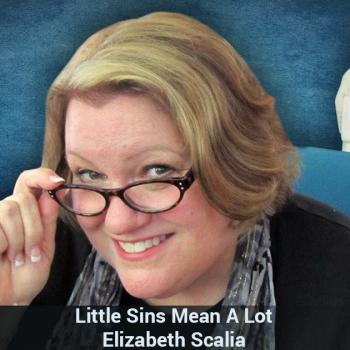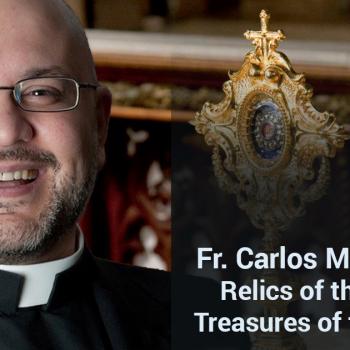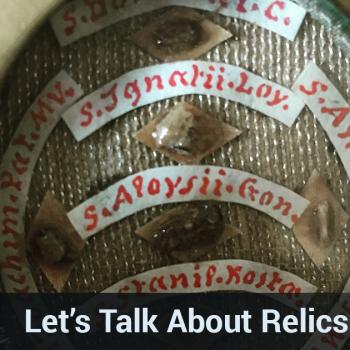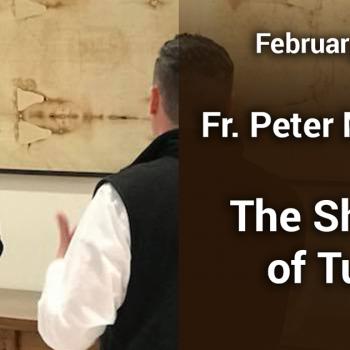A Syllabus
Shortly after my conversion, a social-media acquaintance of mine asked me to explain the Sacrament of Confession. I thought long and hard about what to say, and how to phrase it so that it would make sense to Protestant ears. Eventually, I decided on a logical path I could take that would explain the reason that Catholic theology requires the Sacrament of Confession.
This was the introduction to part 1:
As I began to formulate this answer, I realized that it would not be short or simple. Imagine going to a box of Christmas lights and attempting to retrieve only one. Most often, you end up with all the wires in the box coming out as one big ball. In order to retrieve just the one, you have to sit there and focus on the winding path of the one you want, paying attention to all the places where it intersects with the others. The doctrine of the sacrament of Confession is not all that difficult. I could answer it in a few short scriptures and be done with it. But, those scriptures a Catholic uses to support confession are not interpreted the same way by Protestants. And so in order to give an answer for why Catholics confess our sins to a priest, we must first address the nature of sin, the nature of sacrament, and the validity of the priesthood, and all of these concepts hinge on the way Catholics view Scripture.
I practically put together a syllabus for a semester-long lecture series. Ultimately, I became too daunted by the amount of material I couldn’t articulate, and I gave up.
Tonight, As I stood in line for confession, I realized that I had tried to give a lecture instead of an answer. So tonight, let me attempt to give the answer that I should have given years ago.
“Why do Catholics go to confession?”
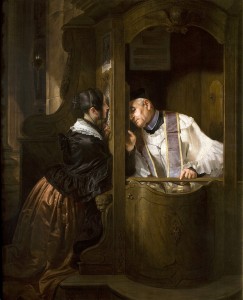
I’m glad you asked! I can’t speak for all my fellow Catholics, but I can tell you why I go to confession. I go to Confession because so many times I choose to do wrong and fail to do right. I go to Confession because, when faced with the choice, to often I choose my familiar sin over my Father God. Every time I sin, I damage my relationship with Him. Every time, I choose to distance myself from His grace in order to draw nearer to my own sins that so easily entangle. I go to Confession because I need to be reconciled again to God, to be forgiven by His never-ending mercies, and to draw near again to His grace.
Now, there aren’t many Christians who would disagree with my assessment of myself, but quite a few would disagree with the act of Confessing to a priest. Some (maybe even you) say that no man can forgive me, that only God can forgive. I could respond that in Mark 2:10, when Jesus forgave the paralytic, He also healed him in order “that you may know that the Son of man has authority on earth to forgive sins…” I could quote James 5:16 which emphasizes the necessity of confessing our sins to one another. I could also point to 1 John 1:9 which says “If we confess our sins, He is faithful and just, and will forgive our sins and cleanse us from all unrighteousness,” and make note that John did not use the word “acknowledge,” but rather used a word that included a verbal component – “confess.” I could even point to the institution of the sacrament in John 20:23, when Jesus said to His Apostles, “If you forgive the sins of any, they are forgiven; if you retain the sins of any, they are retained.” But depending on your hermeneutic, you may not accept my interpretation of those scriptures. So what is an adequate answer?
My Story
I grew up in a faith tradition which taught that there was no sin so great that God could not forgive it. Not only that, but that He never tired of forgiving. He would forgive and forget. He wouldn’t even remember what it was that you had done after you had sought forgiveness. I was taught that forgiveness was only a repentant thought away. Most of this I believe today; but I did not believe it then.
Several years ago, when I was still on my journey to healing and forgiveness I started to write a song. I never did finish it because I couldn’t figure out how to say what I needed to say without sounding trite or triumphalist, but it started out like this:
I’ve said, and done, and been
A lot of evil in my days
And I’ve never been the poster child for innocence.
As I look at my life I find
a lot of wounding in my wake
And I’ve nothing I can say to you in my defense.
The song went on to say how God had worked redemption in me. But regardless of how many times I sang about that redemption, or declared it, or repeated it to myself, I didn’t believe it. My past was a continual weapon that the enemy of my soul used against me. I intellectually knew that my theology said I was forgiven completely, but I still felt the stain of my sin; I still felt separated from God. There were moments when I would have a profound encounter with God, and know fully that God loved me and had forgiven me of my sins, but eventually the shame and guilt would return. It didn’t matter how many times I looked in the mirror and told myself that the remaining guilt was a lie from the devil, the guilt remained.
My sin was dark enough that I didn’t feel comfortable telling a youth director or pastor or accountability partner. Part of this likely stems from the fact that I’m a pastor’s kid. Part of it stems from the fact that when one of my darkest sins came to light, it was the pastors (who were supposed to keep things in confidence) who gossiped and shared that information with their fellow pastors. So while no laity knew about it, every pastor for hundreds of miles knew, which doesn’t do a lot to build up trust.
As a side note, it is a comfort to know that if a priest even acknowledges that I confessed to him (even if he doesn’t mention WHAT was confessed) he is automatically excommunicated. There is an inviolable seal of confession that protects the Penitent.
As my conversion was imminent, I felt absolutely compelled to go to Confession. My priest was very kind, and likely bent the rules a little by allowing me to go to confession before we were sure of my confirmation date. He listened for nearly an hour as I recounted each sin (at times tearfully) that I had committed since my baptism. Then he said these words — these words that have brought me such comfort time and again:
God the Father of mercies,
through the death and resurrection of his Son
has reconciled the world to himself
and sent the Holy Spirit among us
for the forgiveness of sins;
through the ministry of the Church
may God give you pardon and peace,
and I absolve you from your sins
in the name of the Father, and of the Son,
and of the Holy Spirit.
As he said those final words, I felt a wave of warmth roll over me that I had only ever experienced in times of deep prayer, praise, and worship in the Charismatic services of my youth. I recall being so overcome with those words that I broke down into tears of relief. From that day to this I have never doubted my forgiveness. I have never again been tempted to despair by my past.
When God needed to make a way for us, He took on flesh, became incarnate, and bought our freedom. He knew that we are both Spirit and Body, and that we need more than intangible assurances. Because of this He gave us material conduits by which we can receive His abundant grace! It is God who forgives us through the work of Christ, but He grants us that forgiveness in a tangible way through the priests who act on behalf of the Bishops who are the successors to His own Apostles.
Through the sacrament of confession, I have found an assurance of pardon that I never experienced in all my days of “going directly to God.” To me, confessing to a priest isn’t a hoop to jump through in order to be forgiven, it is a powerful grace that solidifies in my soul the forgiveness that God freely gives.
I go to confession as a prodigal son, humbled and weary, needing to reconnect with my Father God. I go to confession because I know that God will meet me there.







